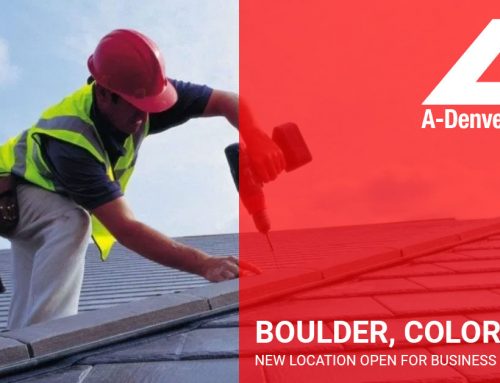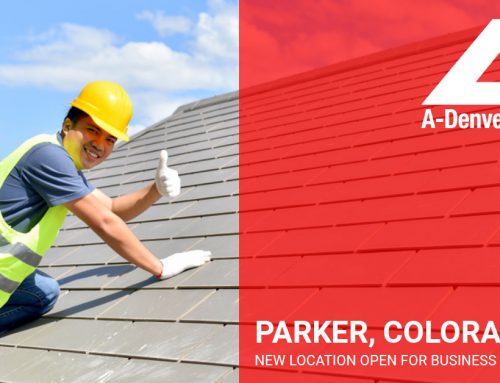Roof Performance is Critical for Solar Installations in Colorado
When investing in a rooftop solar energy system for your commercial building in Colorado, it’s important to make sure that your roof is ready to protect your building for years to come. Installing the right components, and hiring A-Denver Roofing, will help ensure you receive your anticipated return on investment.
Recommendations for all Roofs in Colorado
When installing a rooftop solar array in Denver or Colorado Springs, it’s easy to get lost in electrical considerations, structural calculations, and placement of panels. However, it’s just as important to consider the roof underneath the solar array, and the manner in which panels will be anchored or attached to your commercial building. Some important points to think about include:

Roof warranties and the ability to make repairs

Enhancements to the existing roof or when installing a new roof

Roof access, foot traffic, and maintenance

Solar panel attachment or racking systems
When a solar energy system is to be installed on a new or existing roof in Colorado, commercial building owners should consider the design recommendations outlined in each of A-Denver Roofing’s published roofing system specifications. It is the commercial building owner’s responsibility to ensure that the roofing membrane is adequately protected during construction, hiring A-Denver Roofing will ensure the solar array is installed properly in order to protect the roof. The last thing you want as a commercial building owner is to have to deal with costly repairs, including disconnecting/removing areas of the solar array if your roof becomes damaged by the solar installers.
Recommendations for Existing Roofs in Colorado
- A roof assessment should be performed by an A-Denver Roofing Representative prior to finalizing any upgrades/repairs to your existing commercial roofing system.
- Rack-supported PV arrays should provide proper clearance to access the roof membrane for A-Denver Roofing’s maintenance and repair crews, if necessary.
- When penetration of the membrane is required to secure a racking system to the building structure beneath the roof, the use of circular steel tubing will provide the best possible flashing option and facilitate the use of prefabricated accessories in order to keep the roofing system watertight.
- Areas of the commercial roofing membrane which are heavily traveled during solar panel array installation and subsequent maintenance should be protected with walkway pads and/or pavers.
- Photovoltaic laminates should not be directly adhered to any single-ply roofing membrane.
NOTE: In such instances, A-Denver Roofing specifications and details should be followed and the flashing performed by an authorized A-Denver Roofing applicator to ensure that the warranty will not be voided.
Recommendations for New Commercial Roofing Installations in Colorado
- A-Denver Roofing recommends that new construction commercial roofs expecting an immediate PV system installation and commercial roofs being installed as ‘PV ready’ should specify the use of an adhered high compressive strength cover board (e.g. DensDeck®, SECUROCK®, or SecurShield® HD) and an adhered membrane. Contact A-Denver Roofing with any questions regarding this.
- We also recommend installing an adhered commercial roofing membrane system equal to or greater than the expected life of the solar energy system.
- A-Denver Roofing recommends that ballasted solar racking systems utilize a protection layer of membrane between the ballast trays of the racking system and the roofing membrane to provide protection and facilitate drainage.
- Finally, we recommend that non-penetrating attachment methods that rely solely on a heat-welded seam for anchoring solar panels to a thermoplastic membrane NOT be used.
Design Recommendations for Solar Installations in Colorado
» Specify FleeceBACK membrane with full coverage utilizing low-rise foam adhesive for maximum puncture resistance.
» Specify thicker membrane such as .090 mil EPDM or .080 mil TPO or PVC for longer service life and fewer punctures.
» Specify a rigid cover board attached with low-rise foam adhesive.
» Overlay all seams with coverstrip and use 25- or 30-year A-Denver Roofing system details.
» Install protection layer under any ballasted solar panel racks or support systems.
» Solar panel systems should allow for access to all areas of the roof for maintenance or if repairs are needed.
Cautions and Warnings for Colorado Solar Installations over Single-Ply Membrane Roofing Systems
» Commercial building owners should consult a structural engineer to avoid overloading or point loading the roof. A-Denver Roofing can recommend qualified engineers with experience in solar roofing projects.
» Always ensure that PV systems comply with local building codes.
» Ensure proper attachment and anchoring of PV while protecting the roof.
» Areas designated for staging of roofing or restoration materials and PV array components prior to construction should be protected to prevent damage.
» Maximum distributed, lateral, and point loads should be determined by the building owner or their design professional to avoid exceeding the maximum compressive strength of the roofing assembly.
» Coordination between A-Denver Roofing authorized roofing applicator and PV system installer/electrician is essential to minimize delays, avoid unnecessary rooftop traffic, and avert possible physical damage to the roofing membrane.
» On new or existing membrane installations, attachment of slip sheets, walkway pads, sacrificial sheets, and all necessary flashings/terminations or modifications to the roofing assembly must be performed by an A-Denver Roofing authorized roofing applicator. Failure to comply will result in a loss of the system warranty.
» Walkway pads, protection pads, slip sheets, and sacrificial sheets shall be of the same color as the roofing membrane.
» A-Denver Roofing will not warrant or approve the integrity, installation, or performance of any solar system or solar system component system component. We will however work with hour solar installer to make sure both systems are compatible with each other.
Warranties and Quality Assurance for Solar Installations in Colorado
For new or existing projects, the A-Denver Roofing roof system warranty will cover deficiencies in manufacturer-supplied material or labor performed by A-Denver Roofing within the limits in the warranty.
» Always call A-Denver Roofing before beginning a solar array installation. A-Denver Roofing will perform a roof assessment before solar array installation begins.
» A-Denver Roofing will perform a post-installation inspection to ensure the roof is still in warrantable condition.
» Damages to the roofing system resulting from PV operation or maintenance are beyond the coverage of a new or existing A-Denver Roofing warranty. Which is why it is critical you involve us in the early stages of your commercial building solar installation project in Colorado.
» Should the dismantling of panels and/or the removal of modules be required to complete repairs covered by the membrane system warranty, these costs shall be the owner’s responsibility and are not covered by the A-Denver Roofing warranty.
Benefits of Rooftop Solar Installations in Colorado

Energy generation As solar energy technology has become cheaper and more efficient, it has become a more attractive energy source for many commercial building owners. This is especially true for Colorado, with its many days of sunshine.

Government Incentives
Commercial building owners in Colorado can take advantage of government incentives to make installing solar panels on their roof a worthwhile investment.

Commitment to Sustainability and Renewable Resource
Solar energy is an excellent source of renewable electricity in Colorado, and installing a commercial rooftop solar array is a perfect way for companies and commercial building owners to demonstrate their commitment to sustainability while using space that is otherwise unused.







